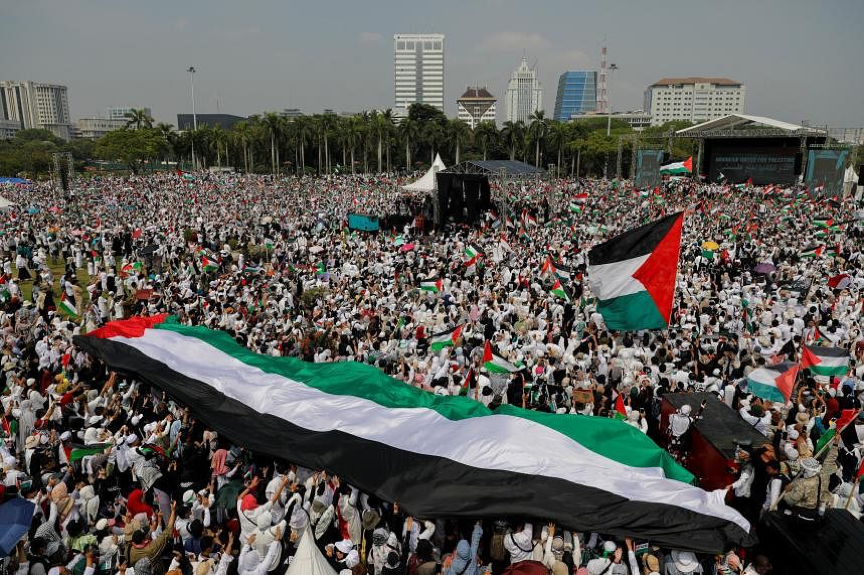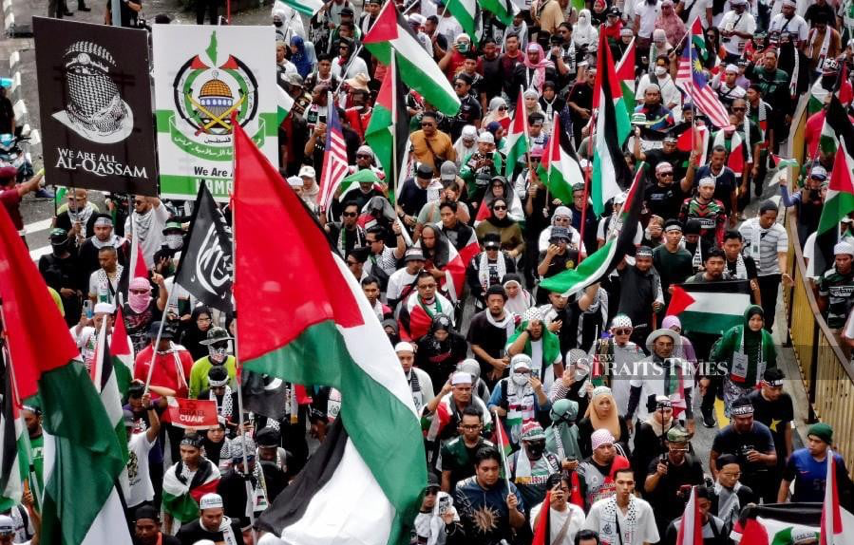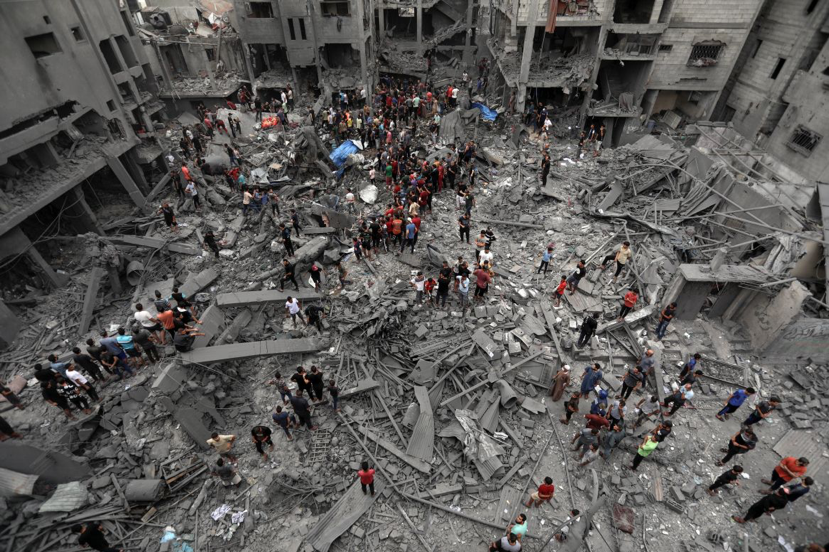The Gaza enclave, home to 2.3 million Palestinians, is in dire need of humanitarian aid as Israel continues to cut off food, fuel and electricity supplies. The sustained bombing and military action is targeting Hamas fighters who killed more than 1,400 people in the October 7 attack in Southern Israel. As of July 2024, more than 39,000 Palestinian civilians have been killed in the fighting, with over 70% being women and children.
The international community has been calling for a ceasefire to end the humanitarian disaster and prevent further casualties. Demonstrations have erupted in various major cities in both pro-Israel and pro-Palestinian countries. Additionally, social media users consistently demand a ceasefire between the conflicting parties to prevent more casualties, especially among women and children. They are calling for more efforts for humanitarian aid to be delivered to the people of Gaza, which has seen housing, hospitals and medical care destroyed and the population facing displacement and famine on a catastrophic scale. In response, early in the conflict, the United Nations (UN) issued the Civilian Protection resolution, outlining Israel’s legal and humanitarian obligations. In a session attended by 179 representatives of a total of 193 UN member states, 120 countries supported the resolution. In Southeast Asia, almost all countries supported the UN resolution, except the Philippines, which chose to abstain. The views and positions of each Southeast Asian country on the Israel-Palestine conflict vary, depending on the level of relations they have with both countries.

Have the connections between ASEAN countries and Israel and Palestine influenced their support for either party in the conflict?
Political and diplomatic factors such as bilateral relations with Israel or Palestine, can play a key role in determining a country’s position on the conflict. ASEAN member countries can be categorized as supporting Palestine, supporting Israel or remaining neutral.
Indonesia, Malaysia, and Brunei Darussalam, openly express solidarity with Palestine in the Israel-Palestine conflict. They have voiced strong support for Palestinian rights and condemn any Israeli actions violating human rights. Until now, these majority Muslim countries have not established formal diplomatic relations with Israel. They continue to reiterate solidarity with the Palestinian people and call for an independent Palestinian state.
On the other hand, the Philippines and Singapore have good relations with Israel. The Philippines is among the nations that recognized Israel in 1948 after it proclaimed Independence. The Philippines and Israel have close economic and military cooperation, with the Philippines showing support for Israel and choosing to abstain from voting on the United Nations resolution, which strongly condemned attacks by Israel on Palestine and called for an immediate truce. The Philippines has allowed a Palestinian representative mission to open in Manila, affirming its commitment to a two-state solution, and its support for the United Nations to provide humanitarian assistance. The presence of a large Filipino community in the Middle East and Israel accentuates the relevance of this issue to the Philippines. In line with the Philippines, Singapore also has economic and defence cooperation with Israel. Since 1969, Singapore and Israel have had diplomatic relations and opened embassies in their respective countries. Singapore also established diplomatic relations with Palestine in 1989, opening a representative office in Palestine in 2015, underlining Singapore’s commitment to strengthening diplomatic relations. Singapore supported the United Nations voting of a UN resolution supporting a two-state solution while condemning acts of terrorism by Hamas and recognizing Israel’s right to self-defence. It has taken a balanced view, seeking to maintain stable ties with both sides, condemning all forms of terrorism and urging all parties to stop the conflict to protect the safety and security of civilians. Countries like Laos, Myanmar, and Cambodia take a more closed approach and refrain from making explicit statements in favour of either party. Vietnam and Thailand have embassies in Israel and tend to remain neutral in this conflict while maintaining a consistent foreign policy supporting a two-state solution in the Middle East.

Hamas’ presence in SE Asia may be influencing support for Palestine.
Malaysia’s prime minister, Anwar Ibrahim, is by far the most outspoken leader in Southeast Asia in support of the Palestinians. Anwar has decried Western pressure to condemn Hamas. Officially the Palestinian Authority has an Embassy in Kuala Lumpur and a diplomatic mission in the Philippines. Malaysia, a Muslim-majority nation has long advocated for the Palestinian cause, reflecting a social and political consensus amongst Malays. Senior Hamas officials have long received a warm welcome from Malaysian politicians.
Kuala Lumpur opened the first Asian office for the Palestinian party Fatah in 1969 and in 2011 founded the Palestinian Cultural Organization Malaysia (PCOM), which was designed to raise domestic awareness of the Palestinian cause, but has also functioned as a platform for Hamas, While Palestine maintains an official Embassy in Kuala Lumpur, Hamas can boast an unofficial one. At this stage, Malaysia’s support for Hamas does not appear to have a significant influence on other Asian countries.

ASEANs Humanitarian support for Palestine
Malaysia, Indonesia, Brunei and Singapore are the ASEAN countries which have provided extensive humanitarian assistance to Palestine. Islamic Relief Malaysia (ISM) has been working in Gaza since 1997, providing food, clean water, shelter, community development projects, education and medical support. In 2024 ISM launched a Palestine appeal campaign to provide continuous support to Palestine. The Malaysian public, including celebrities, businesses and even schools in Malaysia, has rallied to support the Palestinian cause. This has included the involvement of popular influencers, including top local singer Siti Nurhaliza, who has nine million followers on Instagram. Local businesses also donated a portion of their sales proceeds to the cause, including Ashanim Dress Lab, which pledged to donate 10 per cent of the sales from its Palestine headscarf line to the Palestine Humanitarian Fund.
Deputy Finance Minister Steven Sim has asked Malaysians to purchase Palestinian products as a sign of support. This has seen businesses such as Mcdonald’s and Starbucks which have American connections, to be blacklisted by many Malaysians, forcing Mcdonald’s to declare it was an independent franchise and will continue its business in Malaysia. Asia Thinkers talked to one Malaysian lawyer who declared that “it may be difficult to directly fight for the Palestinian cause, but we Malaysians can support by buying Palestinian products, such as olive oil and dates.” She further commented that the support for Palestine is seen as not only a humanitarian issue but more importantly, a religious obligation.
This approach has inspired donations from the Malaysian general public, with McDonald’s (Malaysia) donating USD200,000 to the Government’s Palestine Humanitarian Fund. These funds have assisted in providing the construction and maintenance of orphanages, education assistance to Palestinian students, supporting charitable agricultural and social projects, medical aid in the Palestinian Territories and financial support of Palestinian students at Malaysian Universities.
The Muslim countries of Indonesia and Brunei also feel that support for Palestine is not only a humanitarian issue but also a religious obligation. There have been regular peaceful demonstrations in support of Palestine in Indonesia and Brunei with many rallies in Indonesia being interfaith events to which Muslim, Catholic, Protestant, Buddhist, Hindu and Confucian leaders were invited. Several Indonesian businesses have been boycotted as a result of their support for Israel, including McDonalds (who provided free meals to the Israeli Military during the Gaza conflict), significantly impacting their retail sales in the country. Indonesia has provided aid such as food, medical supplies, blankets, tents, and other necessary logistics to the Palestinian community. In July it dispatched a hospital ship with humanitarian supplies, including 200 tons of food, medicine, tents and clean water. The Government of Indonesia continues to channel humanitarian assistance for Palestine and has declared it will accept 1000 refugees from Gaza for educational purposes in Islamic boarding schools in West Java.
Similarly, Brunei has provided both financial and continuous emergency support in the form of food packets, declaring solidarity with the Palestinian people. Brunei launched the Humanitarian Fund for Palestinians in Gaza, with a public walk to raise funds attended by over 8,000 people, including politicians. The “Steps for Solidarity” aimed at bringing the community together to promote peace, raise awareness, and engage in positive fundraising activities for all ages, supporting the raising of funds for Palestinians in Gaza.
Singapore is another major donor of aid to Palestine and continues to actively deliver humanitarian aid through the Singapore Red Cross, including medical supplies, clean water and food and providing capacity-building funding to the Palestinian authority. More recently it has provided food packs and emergency supplies through humanitarian air drops in conjunction with the Singapore Airforce. Humanitarian aid groups have supported fundraisers which saw charities raise 6 million dollars and 2,500 blankets for Gaza. Initiatives such as the Palestinian film festival and netizens on social media have significantly influenced solidarity and support for the Palestinian cause in Singapore.
The impact of the Palestinian conflict remains a balancing act for most ASEAN countries. Widespread calls for a ceasefire and adherence to international law, while providing much-needed humanitarian aid to Palestine and supporting a two-state solution, are creating an ongoing challenge.

